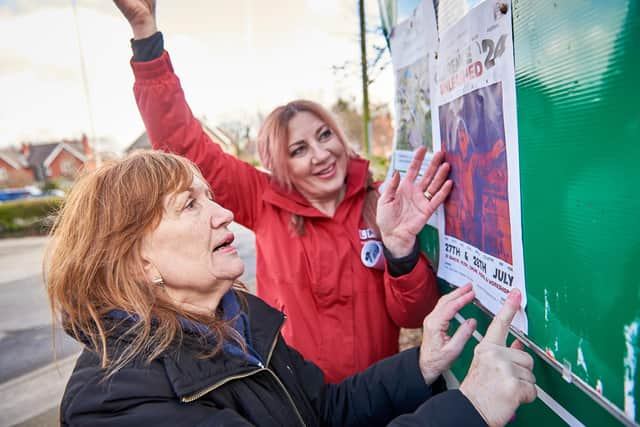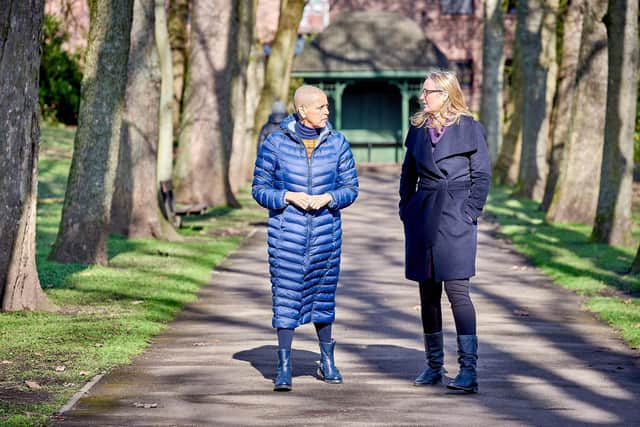Wakefield's Clarence Park volunteers part of pilot project to combat harassment and improve safety for women and girls
and live on Freeview channel 276
The new project is the first of its kind in the country and involves training staff who work in public spaces to intervene when they see harassment, bullying and discrimination.
Rachel Winstanley and Kate Honeyman, who have recently received the bystander training, have volunteered in Wakefield’s Clarence Park for years as part of Wakefield Music Collective.
Advertisement
Hide AdAdvertisement
Hide AdRachel said: It gave us more confidence to [intervene]. We've been doing events in the park for many years, so obviously we do see a lot of things ourselves.


"I would say it has helped to give us some ideas of how to handle people – more ideas than we'd thought of – and also that came not just from the training but from the attendees because everybody did have different ideas which was great.
"The distraction techniques were really good, dropping a book right next to somebody, things like that.”
Personal safety is something the volunteers feel they have to consider for themselves when working in the park.
Advertisement
Hide AdAdvertisement
Hide AdKate said: “In the winter by quarter past three, I leave the park if I'm out and I walk round the outside of it.”


The volunteers were optimistic the training would help to make the park safer, and are keen to pass on the information to others to spread awareness of the training.
It follows research by the University of Leeds – funded by the Mayor of West Yorkshire Tracy Brabin – which concluded that most women and girls feel unsafe in parks in some situations.
Dr Anna Barker is an Associate Professor in Criminal Justice and Criminology at the University of Leeds and led the research underpinning the pilot project.
Advertisement
Hide AdAdvertisement
Hide AdShe said: When we leave incidents of harassment unchallenged, we perpetuate injustice and fail to change the status quo.
“The training – which teaches people how to safely intervene – “actually confronts and chips away at that harmful pernicious culture of harassment that we are all experiencing.
"Women and girls thought that it was important that essentially everyone is looking out for them, everyone is looking out for each other's safety so whether that's the dog walker, the park keeper, the volunteer, people in the cafe, people in the bandstand – everyone has a role in looking out for other women and making them feel safe and to try and spot harassment when they see it.
"We had two really successful training sessions on Friday just gone with about 80 members across West Yorkshire. These were people who had come to develop the confidence, skills, but also to feel confident that they can do something about harassment.
Advertisement
Hide AdAdvertisement
Hide Ad"Every single one of them went away from that session knowing that there is at least one thing that they can do.”
The training aims to empower bystanders to positively influence the outcome of a potentially harmful situation. The Stand Up Against Street Harassment training is designed to prioritise safety, utilising the ‘five D’s’: Distract, Delegate, Document, Delay, and Direct.
Research conducted by L’Oréal Paris and IPSOS between 2019 and 2021 revealed 80 per cent of women in the UK have reported experiencing harassment in public spaces, and 75 per cent of harassment victims said no one helped.
The project is a collaboration between the West Yorkshire Combined Authority (WYCA), Keep Britain Tidy and the Suzy Lamplugh Trust.
Advertisement
Hide AdAdvertisement
Hide AdThe University of Leeds’ research concluded: “Feeling unsafe in West Yorkshire’s parks is a barrier that needs to be addressed and prioritised to ensure that women and girls feel equally able to use, enjoy and benefit from parks.”
It found that 57 per cent of women thought the parks in their area of West Yorkshire were either ‘very’ or ‘fairly’ unsafe, and this figure rose to 76 per cent for girls. 97 per cent of the women who participated felt unsafe alone in parks after dark, and one in five women and girls felt unsafe alone in parks during the daytime.
Alison Lowe, Deputy Mayor for Policing and Crime in West Yorkshire, said the safety of women and girls is at the heart of the policing and crime plan.
She said: “One of the things that women were telling us was that they didn't feel that they could take power back and have control of their own parks and green spaces. They didn't want to go out, they didn't want to run, they didn't want to partake of all the fabulous things that we all like to do in our green spaces.
Advertisement
Hide AdAdvertisement
Hide Ad“We were shocked that many many women were saying to us that they were frightened to use their green spaces.
“As a result of the research, Leeds University then developed a guidance document which helps local authorities, parks more generally, decision makers, and leaders to actually design parks with women and girls in mind. We sent it to every local authority in the country, and I understand now that that work is international. Local authorities from across the world are asking us about that guidance document because they see that if they want green spaces to be accessible by all, then they have to include the wishes and the ideas of women and girls.”
Alison said the success of the pilot will be measured by feedback received by the mayor from women’s groups as well as data collected by local authorities on the usage of the parks.